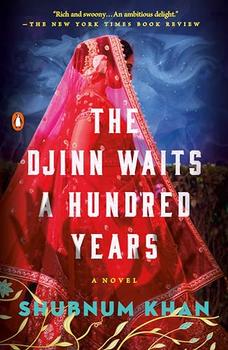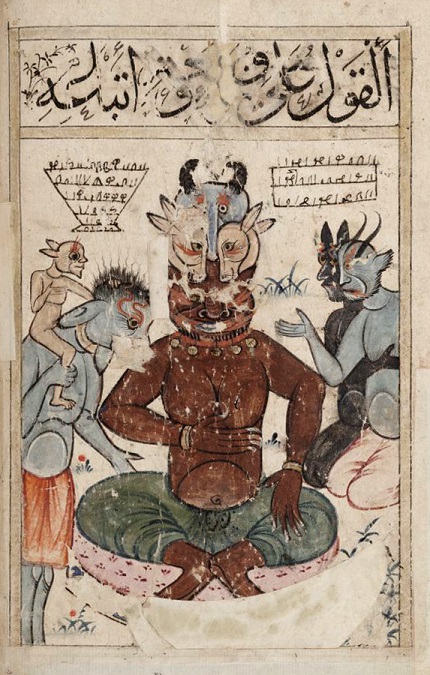Summary | Excerpt | Reading Guide | Reviews | Beyond the Book | Read-Alikes | Genres & Themes | Author Bio

A Novel
by Shubnum KhanThis article relates to The Djinn Waits a Hundred Years
 In Shubnum Khan's debut novel The Djinn Waits a Hundred Years, set amidst the Indian diaspora of South Africa, fifteen-year-old Sana and her father move into a dilapidated house by the sea that is haunted by a djinn. The djinn is the link between past and present, a connection between the 21st-century tenants and the immigrant family who lived there in the early 1930s. This mythic spirit serves as a manifestation of the Islamic history and culture brought to South Africa by the Muslim Indian émigrés — an unseen witness to their past and present lives.
In Shubnum Khan's debut novel The Djinn Waits a Hundred Years, set amidst the Indian diaspora of South Africa, fifteen-year-old Sana and her father move into a dilapidated house by the sea that is haunted by a djinn. The djinn is the link between past and present, a connection between the 21st-century tenants and the immigrant family who lived there in the early 1930s. This mythic spirit serves as a manifestation of the Islamic history and culture brought to South Africa by the Muslim Indian émigrés — an unseen witness to their past and present lives.
In her CrimeReads essay, "Decolonizing the Gothic," Khan writes of her family history and the stories told by her grandfather, who emigrated to South Africa in 1935. Among the most potent and vivid of the stories and legends her family brought with them from India are those of djinns (also spelled "jinn" or "jinni," and etymologically the origin of the English word "genie"). Djinns are a race of spirits in Islamic mythology who were created out of fire by Allah. They are shapeshifters who take on animal and human forms. They can make themselves invisible, see the future, possess bodies and inanimate objects, spread disease, and generally wreak havoc. In South Africa, djinns are also linked to curses and spells, and spirit healers are called upon to remove them. In the mortal world, they inhabit dark places such as caves, cemeteries, ruins or run-down buildings, again, like the djinn in Khan's novel.
Legends about djinns are found throughout Islamic folklore and literature, appearing in everything from the tales of the One Thousand and One Nights to Netflix and UNESCO's 2023 series of short films, African Folktales, Reimagined. Their origins date back to pre-Islamic Arabic pagan cultures. They were nature spirits who served to inspire poets, philosophers, and prophets by granting them glimpses of the supernatural world. As Islam spread west to Africa, the concept of the djinn was absorbed into the local communities' preexisting beliefs about the spirit world.
In Morocco, there are legends of djinns inhabiting trees; tree djinns are sympathetic to humans and will allow them to rest in the shade — though the fig tree must be avoided, as its djinn is mischievous and delights in inciting quarrels. According to a 2012 survey done by the Pew Research Center, 86% of Moroccans believe in the existence of djinns. The belief in djinns is also prevalent in Egypt: in 2021, The New Arab reported that in the Egyptian city of Qalyoub, local people's fear of a djinn residing at the bottom of a well in the 13th-century al-Zahir Baybar Mosque was causing worshippers to stay away. It was rumored the djinn was guarding hidden treasure in the well, but people were too afraid to go near it, and the authorities were urged to intervene and investigate. Other countries with high rates of belief in djinns among the Islamic population include Bangladesh, Pakistan, and Tunisia.
African folklore is replete with stories of djinns and their involvement with humans. Mousa-Gname, or Mousa-Djinni, is an epic hero of the Songhai people of West Africa, and the child of a human woman and tree-dwelling djinn. In the Saharan folk story, "The Tale of Tafaka," a young woman, Binta, sees a pregnant lizard ("tafaka") and offers to help it give birth. When Binta is summoned, she finds the lizard transformed into a beautiful female djinn and stays in the world of the djinns for 40 days, learning about their powers. After she returns, a young man appears looking for a bride, and Binta summons a beautiful female djinn to marry him. Thus djinns and humans are united, and this explains why the women of the Sahara region are all so beautiful. The Djinn Waits a Hundred Years is a worthy addition to this tradition of bringing together djinns and mortals.
Zawba'a, king of the djinns, depicted in a 14th-century manuscript called Kitab al-Bulhan courtesy of the University of Oxford's Bodleian Library
Filed under Places, Cultures & Identities
![]() This "beyond the book article" relates to The Djinn Waits a Hundred Years. It originally ran in February 2024 and has been updated for the
January 2025 paperback edition.
Go to magazine.
This "beyond the book article" relates to The Djinn Waits a Hundred Years. It originally ran in February 2024 and has been updated for the
January 2025 paperback edition.
Go to magazine.
These are not books, lumps of lifeless paper, but minds alive on the shelves
Click Here to find out who said this, as well as discovering other famous literary quotes!
Your guide toexceptional books
BookBrowse seeks out and recommends the best in contemporary fiction and nonfiction—books that not only engage and entertain but also deepen our understanding of ourselves and the world around us.